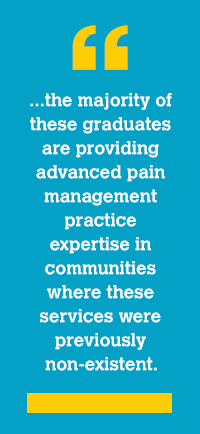
John Maye, PhD, CRNA, Professor, University of South Florida
Dr. John Maye is a Professor and Pain Management Concentration Director for the University of South Florida, College of Nursing. He retired from the United States Navy in 2015 at the rank of Captain after serving for 27 years. A Navy Certified Registered Nurse Anesthetist, he was stationed in the National Capital area from 2003-2015. While serving as the Director of Research for a pain management clinic and providing care to wounded warriors at Walter Reed National Military Medical Center, his thoughts and knowledge related to pain management and opioid administration were transformed. He began to question traditional approaches to pain management education, and it was these experiences that became the driving force behind the creation of the Advanced Pain Management Fellowship and the Integrative Pain Management Graduate Certificate at USF. It is anticipated that these educational offerings will dramatically improve the quality of life and access to pain management care for those with chronic pain and that all health care providers will find this knowledge beneficial to their practice and helpful to their patients. Given the deficit of specialized pain management providers in rural America, health care providers employed in these areas may find the program particularly beneficial.
Dr. Maye, you’ve been involved with AACIPM efforts for many years. What does integrative pain management mean to you?
 Integrative pain management is when an individual or institution can move beyond the traditional views of pain as an interpretation or modulation of a nociceptive impulse. Pain evolves not only from tissue damaging stimuli, but may also serve as a consequence of the way stress, sleep, and central autonomic nervous system tone impact brain function. Pain is a complex phenomenon that is mediated through mechanisms that involve more than the traditional views of tissue damage. These traditional views of aligning pain only with tissue damaging stimuli are limiting and may be the driving force behind economic costs associated with the treatment of pain to be estimated at $560-635 billion annually.
Integrative pain management is when an individual or institution can move beyond the traditional views of pain as an interpretation or modulation of a nociceptive impulse. Pain evolves not only from tissue damaging stimuli, but may also serve as a consequence of the way stress, sleep, and central autonomic nervous system tone impact brain function. Pain is a complex phenomenon that is mediated through mechanisms that involve more than the traditional views of tissue damage. These traditional views of aligning pain only with tissue damaging stimuli are limiting and may be the driving force behind economic costs associated with the treatment of pain to be estimated at $560-635 billion annually.
In 2011, the Institute of Medicine (IOM) recommended the government support substantial improvements in patient and professional education regarding pain. This recommendation included both undergraduate and graduate curricula change to improve pain management education for all health care professionals. To date, there has been some movement toward improving pain education in health care, but there is still a huge deficit with regard to appreciating that the pain experience for a patient is greater than the sum of its parts.
Why did USF Nursing create an Advanced Pain Management Fellowship program for nurse anesthetists, and what does it involve?
The University of South Florida created this program to provide the structure and leadership for the future of pain management in the United States. National rising prescription opioid use and abuse have emerged as major public health problems, resulting in more deaths related to opioid misuse than to traffic fatalities (2007), and a ten-fold increase in drug abuse treatment admissions for opioids. Overprescribing opioids directly contributes to higher addiction rates and death by overdose, and opioid misuse and addiction is considered a public health crisis.
The program uses recommendations provided by the National Pain Strategy (NPS), released in 2016 by the United States Department of Health and Human Services, which outlines the federal government’s first coordinated plan for reducing the burden of chronic pain that affects millions of Americans. Aiming to improve care for the approximately 100 million Americans (37% of the United States population) currently suffering from chronic pain, he NPS makes recommendations for improving overall pain care in six key areas: population research, prevention and care, disparities, service delivery and payment, professional education and training, and public education and communication. Specifically, the National Pain Strategy recommends the following:
- Developing methods and metrics to monitor and improve the prevention and management of pain.
- Supporting the development of a system of patient-centered integrated pain management practices based on a bio-psychosocial model of care that enables providers and patients to access the full spectrum of pain treatment options.
- Taking steps to reduce barriers to pain care and improve the quality of pain care for vulnerable, stigmatized and underserved populations.
- Increasing public awareness of pain, increasing patient knowledge of treatment options and risks and helping to develop a better informed health care workforce with regard to pain management.
The USF Advanced Pain Management Fellowship Program was developed for experienced CRNAs and involves a 15-credit hour curriculum over one year and includes a comprehensive clinical training experience.
How has this addressed the needs of people in rural communities?
 The program has created a pain management curriculum that increases awareness of opioid alternatives and integrative approaches critical for patient safety and access to care. USF’s fellowship program has produced 98 graduates over the last four years, and the majority of these graduates are providing advanced pain management practice expertise in communities where these services were previously non-existent. Many of the graduates from the pain fellowship report that their patients who live in rural communities greatly appreciate having a local provider with pain expertise. These patients are often unwilling or unable to travel to larger metropolitan areas for specialized services. In the past, their only alternative was a prescription for an opioid, which may be part of the reason why these communities have been ravaged by the opioid epidemic. The development of health care providers with advanced pain education can greatly assist those in rural communities with integrative approaches to pain management and limit the number of opioid prescriptions.
The program has created a pain management curriculum that increases awareness of opioid alternatives and integrative approaches critical for patient safety and access to care. USF’s fellowship program has produced 98 graduates over the last four years, and the majority of these graduates are providing advanced pain management practice expertise in communities where these services were previously non-existent. Many of the graduates from the pain fellowship report that their patients who live in rural communities greatly appreciate having a local provider with pain expertise. These patients are often unwilling or unable to travel to larger metropolitan areas for specialized services. In the past, their only alternative was a prescription for an opioid, which may be part of the reason why these communities have been ravaged by the opioid epidemic. The development of health care providers with advanced pain education can greatly assist those in rural communities with integrative approaches to pain management and limit the number of opioid prescriptions.
A new Integrative Pain Management Graduate Certificate will be available to other disciplines starting in Spring 2022. Could you tell us a bit about this program, who is eligible to apply, and why USF made the decision to expand its integrative pain management curriculum beyond nurses?
Based on the success of the USF Advanced Pain Management Fellowship Program for CRNAs and the number of emails and calls we received from other health care providers, we decided to create a second graduate certificate. The Integrative Pain Management Graduate Certificate was developed to provide all health care professionals with an opportunity to expand their knowledge regarding pain management through non-opioid integrative approaches. The program has been designed to improve patient care and accessibility to care through knowledge and education. An exploration of integrative approaches to pain management will be provided through a review of relevant evidence-based literature.
The USF Integrative Pain Management Graduate Certificate will open for admissions in September of 2021 for a January 2022 start date. All licensed health care providers are eligible to enroll. After September 15, 2021, go to https://health.usf.edu/nursing/graduate/programs for more information or contact Johnmaye@usf.edu
Course Sequence
This online program consists of four courses to be delivered sequentially over a two-semester period, as follows:
Spring Semester:
- NGR 6471 Concepts of Pain Pathophysiology: 3 Credit Hours
- NGR 6472 Pharmacology of Pain Management: 3 Credit Hours
Summer Semester:
- NGR 6470 Assessment, Radiology and Psychology of Pain: 3 credit Hours
- NGR 6475 Integrative Pain Management Strategies: 3 Credit Hours:
As you know, AACIPM brings together more than three dozen professional associations representing the broad spectrum of health care providers who treat pain. What do you want to highlight that might be of interest to many of these providers?
The Integrative Pain Management Graduate Certificate was developed to provide education regarding pain management practices based on a bio-psychosocial model of care.

Certificate Aims Include:
- Assisting providers and patients to access the full spectrum of pain treatment options and avoid opioids when appropriate.
- Increase public awareness of pain
- Increase patient knowledge of treatment options and risks
- Assist with the development of a better-informed health care workforce about pain management.
This educational offering is multidisciplinary, and all who enroll will benefit from the interactions with different disciplines.
How have AACIPM’s resources been helpful as USF has been working to bring this curriculum together?
AACIPM has been instrumental for the development of various aspects of our curriculum. I have been able to network with multiple individuals from many different backgrounds, and this collaboration has provided a well-balanced curriculum. The AACIPM website provides a vast amount of relevant information on the latest news, resources, policy, reimbursement, and political issues that help to keep the curriculum relevant and cutting edge. Working with AACIPM has been rewarding and beneficial with regard to improving my knowledge and understanding of the intricacies of pain management, particularly in the realms of reimbursement and political influences.
Trackbacks/Pingbacks